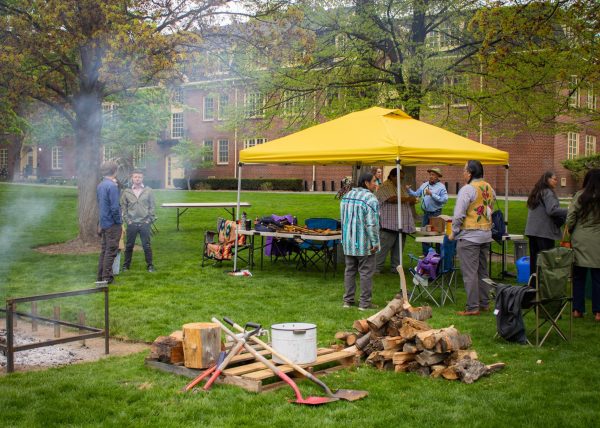Op-Ed: Rethinking Greek Life at Whitman
November 17, 2016
The Greek system has been an integral part of Whitman College since 1912, when the trustees and overseers of the college approved the charter for Phi Mu, Whitman’s first sorority. Since then, Greek life at Whitman has evolved alongside the college, with tens of thousands of students participating in Greek organizations over the past 104 years.
No doubt, the various fraternities and sororities that have been affiliated with Whitman in the last century have had some unequivocally positive impacts on the college — they offer a space for tight-knit community, an institutional framework that encourages and enables positive engagement in the greater sphere of Walla Walla, and act as social hubs, bringing together both Greek and unaffiliated students most weekend nights. Just last month, Kappa Kappa Gamma raised 50,594 dollars for The Health Center in Walla Walla: a truly incredible effort that merits recognition not only on its own terms, but for the example that it sets for civic engagement from the Whitman community more broadly.
There seems to be a perception at Whitman that Greek life here does not fit the same bill as Greek life on the national scale. It may well be the case that Greek organizations at Whitman do not embody the more sinister elements exemplified by Greek life across the country: at Whitman, no Greek initiation activities involve alcohol, and a former member of one of the fraternities characterized his induction as “largely harmless” and in fact suggested that his time spent bonding with other pledges brought him into a strong sense of community. Jacob Fritz, a junior member of Beta Theta Pi said, “[Initiation] also brought us much closer as a pledge class, which is cool because some of those guys are my best friends now.”
I think it is fair to say that nowhere at Whitman do we find the kinds of initiation rituals or Greek practices made archetypical through Hollywood portrayals, or infamously made public by Rolling Stone’s exposé of Dartmouth College’s Greek scene. Nor do we find the utterly reprehensible displays of overt racism and misogyny that have so often characterized Greek organizations at larger universities, and on a national level. However, as beneficial as Whitman’s Greek organizations may be to affiliated Whitman students and the student body in general, as with any organization or set of organizations, they are not without their flaws.
“My experience of initiation clouded my view of the Greek system for a long time. It wasn’t until I saw the way that the fraternity handled sexual assault cases that this rift opened up in that perception,” remarked a former member of one of the fraternities who wished to remain anonymous. Indeed, sexual assault in Whitman’s fraternities is not a new problem: it is a problem that the fraternities often take very seriously. Representatives from each Greek organization work closely with the Whitman administration to plan and create infrastructure to combat sexual violence, and there is no doubt that these organizations are working hard to create safe spaces where sexual misconduct and assault are rightfully stigmatized and deemed utterly unacceptable.
The Sexual Violence Prevention Committee (SVP) represents only one aspect of the nuanced approach that Greek organizations take to fighting rape culture, and Panhellenic President and junior Kappa Kappa Gamma member Molly Unsworth and junior Tau Kappa Epsilon member John Lyon are now seeking to expand this infrastructure beyond the Greek community at Whitman. Their new initiative, Party Safe, seeks to enable students across campus to host successful and safe social functions by providing resources such as water coolers, sober roamers, and pertinent information about sexual assault victim’s advocacy and consent to guests. And yet, despite the best efforts of many in the Greek community and Whitman community more broadly, the problem persists. It persists, in part, because no institutional approach will ever be comprehensive enough to prevent sexual violence entirely — if someone harbors enough flagrant disregard and thoughtlessness for the safety and well-being of others to force themselves on another human being, no imposed structure or set of rules can prevent them from doing so. But at the same time, this is not to say that institutions such as Whitman should not continue striving towards a more adequate, more thorough approach to sexual violence and misconduct prevention.
In this light, there are some statistics worth noting about Greek life and sexual assault. On the national level, men in Greek organizations have been found three times more likely to commit rape than unaffiliated men. Women in sororities are 74% more likely to experience rape than unaffiliated women. At Whitman, in 2016 alone, 45.5% of all sexual assaults have been reported against members of Greek organizations, and of all reported assaults at Whitman, 94% of the alleged perpetrators identify as male. As student Maia Watkins pointed out in her opinion piece last spring, these numbers are particularly concerning because only about a third of male-identifying students at Whitman College belong to the Greek system. This means that a disproportionate amount of reported sexual assaults are perpetrated by Greek men at Whitman.
Now, these numbers are not as straightforward as they may seem — Greek organizations at Whitman, especially in recent years, have placed an enormous emphasis on encouraging students to report any and all incidents. The social infrastructure provided by Greek organizations enables this kind of consistent reporting, and while sexual assault remains, in general, underreported, it is very likely that the Greek community at Whitman does a better job of reporting sexual violence and misconduct than other factions within the school. The extent to which the Greek community reports incidents more successfully than unaffiliated students, unfortunately, remains outside the scope of what we can know: this margin of unreported assaults rests firmly in the area of pure speculation. With these caveats in mind, the 15% uptick in 2016 of reported assaults that began at fraternities does not necessarily represent the occurrence of more assaults, but may simply reflect more accurate reporting.
In bringing these statistics to light, in no way do I mean to demonize men in the Greek system — in the words of Simone deBeauvoir, “these facts cannot be denied: but they do not carry their meaning in themselves.” I do want to draw attention to the fact that Greek organizations, although they enable more accurate reporting of assaults and operate on the frontlines of Whitman’s efforts to reduce sexual misconduct and violence, may not necessarily provide a space where sexual violence can be adequately countered and combatted.
There are structural difficulties to be overcome when trying to fight sexual violence in the context of Greek life. The fact that sororities cannot host parties of their own because they lack a venue, but must instead rely on fraternity houses to host social events may contribute to a sense of entitlement amongst Greek men, and may also contribute to a feeling of anxiety on the part of party guests, a feeling that perhaps in order to be polite they owe the host something. Unsworth remarked, “I think every student on campus is so aware of this issue. As a sorority woman, I am so angry at the college. I don’t understand why sorority women don’t have a space to host functions, I don’t understand why there isn’t a space where independent students can host social functions. I do understand the reasoning given by the college (financial issues, increased liability, etc.), but I am just still frustrated with the lack of conversation or unwillingness as I see it to engage in these conversations.”
It may also be the case that Greek organizations create environments where unacceptable rhetoric that objectifies or degrades others can become normalized, and where a sense of responsibility toward other members can supersede ethical responsibilities to the broader community. Unsworth also commented that, “it’s easiest to give a pass to people that are close to you, and I think that is one the biggest issues that the Greek system has, is that you’re in a big group and big chapter and it’s easy to give a pass to the person sitting right beside you, but when you’re in this big organization, there are a lot of people you could potentially be giving a pass to. And this is one of the biggest problems that the SVP is committed to fighting.”
An anonymous former member of one of the fraternities stated, “I was deeply troubled by how easy it was for some of my then-brothers to dismiss accusations against members of [their fraternity].” This kind of insularity, and failure to listen to potential victims of assault represents a legitimate cultural problem in the Greek community, and one that can be seen in the much broader cultural failing of our society to consistently take victims of sexual violence at their word.
This kind of insularity is not necessarily unique to the Greek system. Associate Dean of Students Juli Dunn remarked, “Whether it be Greek life, or athletics, or debate, or clubs on campus, you give people passes that are in your community. So someone in my community who I’m friends with, I watch them in engage in sketchy behavior or unwelcome touching, and I give them a pass cause I’m like ‘They’re a good guy or good woman,’ but we’ve got to stop giving our friends passes, because that’s what’s going to alleviate this.”
And this is undoubtedly true. Other institutions which are, by many metrics, similar to Whitman but that do not offer Greek life to their students nevertheless experience similar rates of sexual violence on their campuses. The effect that enclosed communities within institutions can have in perpetuating or allowing unacceptable behaviors cannot be denied, and as a campus we need to work to call out these behaviors whenever we see them, regardless of our proximity or connection to the person performing these actions.
In the last two weeks, it has come to attention that at least ten people have reported symptoms consistent with dissociative drugs such as ketamine, rohypnol, or gamma hydroxybutyrate (GHB). Each and every one of these ten people belongs to a Greek organization, and while the investigation into who perpetrated these druggings and where these druggings took place is ongoing, to dismiss this correlation as mere coincidence seems to me to be a mistake. This drugging has ruptured trust in the community on a level that, for me, remains unprecedented in my time at Whitman — it has grievously injured not only Greek organizations and the ten individuals who were directly victimized by this act of terrorism, but has likely made every member of this community feel less safe in social spaces. No matter how different Whitman’s Greek organizations may be from the mainstream of Greek organizations in America, and no matter how many other factors exist at our school that may contribute to Whitman’s sexual violence problem, there is little doubt in my mind that Greek organizations present a structural hurdle to the Whitman community’s efforts to eradicate sexual violence.
I know it will not necessarily make me too many friends to say that I think Whitman College needs to legitimately consider discarding the Greek system once and for all. And I fully understand the many positive contributions that Greek life makes to the Whitman and Walla Walla communities. Nevertheless, there are other modes of social organization that can retain these positive contributions while working to eliminate the detrimental and corrosive aspects of Greek life that can perpetuate rape culture and insularity at the expense of the broader community. Bowdoin College, for example, replaced their fraternity houses with co-ed social houses in 1997, the culmination of a slow phase-out that took many years. Middlebury College has also replaced their fraternities with social houses, and while sexual assault is still a problem on both campuses, the administrations at both schools feel that they are better off without the Greek system.
Though Whitman may have a number of reasons to retain the Greek system, perhaps the strongest argument for keeping it is a purely fiscal one: the administration may fear losing donations from wealthy alumni/ae who partook in the Greek system while at Whitman, who would refuse to donate should the school do away with their respective organizations. This puts the school in a tough spot. Evidently Whitman is subject to the realities of capitalism, and donations from alumni/ae enable the school to continue to fund some of its most important programs. Yet at what point do the safety and well-being of Whitman’s students supersede the demands of the fundraising office? Is it ethical to place the school’s fiscal health over the need of the current student body to inhabit safe social spaces? To place a long-standing tradition of Greek life at Whitman over the moral imperative to combat rape culture? I would argue that at no point does that fiscal responsibility or tradition take precedence.
Junior member of Tau Kappa Epsilon and Party Safe cofounder John Lyon stated, “I think there is logic to the argument that we don’t need the Greek system. And if there’s not going to be a Greek system, then there needs to be a community that is invested in taking care of each other. If that exists, then we don’t need a Greek system. But that does not exist right now.” We may not be able to end sexual violence outright, and doing away with the Greek system overnight would certainly not be the correct approach.
Parker Dawson, senior member and president of Tau Kappa Epsilon said, “I think Whitman should move slowly, emphasis on slowly, towards eliminating the Greek system.” We can begin to take steps to alleviate the presence of sexual violence and misconduct on our campus by placing an emphasis on the Whitman community as a whole over the smaller, insular communities that make it up, by creating new social infrastructure that is dedicated to fighting rape culture, and by beginning to move away from the anachronistic mode of social organization that is Greek life.











Anonymous • Dec 3, 2016 at 8:41 pm
I think people in the Greek community are quick to judge your article as accusatory, but I don’t see it that way at all. I myself, am in a sorority, but I understand we are problematic as well. I think your article highlights our community’s own insecurities as a body that perpetuates this type of violence, and that we worry about our own self image before the safety of others. That is completely true.
Fraternities normalize actions that perpetuate rape culture. Although many of the men in the fraternities are not assailants or accused rapists, they normalize language that degrades people that are not them, and degrade spaces that are not for men. I’ve seen it too many times where fraternities defend rapists, because brotherhood over everything is more important to them than human life. What people don’t understand is the fact that if you are not careful with small actions, such as unwanted touching or sexual harassment, your actions can lead to something that is incredibly detrimental to someone’s well being. We all have the capability to be perpetrators and survivors. We cannot hold ourselves, or others to a higher regard just because we think we are “good people.” Our actions and their impact weigh more than our intentions.
If you don’t like this article, don’t complain about it. Make changes to your behavior and make this campus safer.
Lloyd • Nov 29, 2016 at 10:30 am
What significance does this stat reveal? “At Whitman, in 2016 alone, 45.5% of all sexual assaults have been reported against members of Greek organizations.” Your entire article frames sexual assault as almost an exclusively Greek thing, yet the majority of sexual assaults have been perpetrated by Independents. Granted the ratio of Greek to Indy total on campus is important to consider. A couple quick calculations might help you support your article.
Wayne Silzel Whitman '58 • Nov 18, 2016 at 4:13 pm
To single out the fraternity system as a leading cause is folly. Proper behavior is a qualification for membership in Greek organizations and the threat of expulsion of offenders has always been a front line deterrent before the college’s administration is called upon to take action. Enforcement of the fraternities’ existing codes of conduct are reinforced by chapter alumni advisors as a preemptory remedy and diminishes the need for enforcement of college policies. Small living groups can respond faster and more effectively.
Universities would be wise to work with and embrace the fraternities’ efforts to combat social problems rather than single them out as a scape goat. Without them, the sole responsibility of organizational and individual behavior must be born by the college.
Emma Dulaney • Nov 18, 2016 at 10:51 am
im so so tired of hearing sexual assault on our campus discussed only in the context of the greek system. it is simply making an elitist discussion (what happens on a college campus), more elitist (what happens in the greek system). i understand there are institutional issues the greek system faces that promote sexism and normalize rape culture. i think its all too easy for the indie community (me included) to simply scold the greek system while not reflecting upon the normalization of the sexually aggressive behavior that is consistently present at indie gatherings. the “brotherhood” of excusing the sexual violence perpetuated on another human by a friend is by no means limited to the greek population. i know this all too well from personal experience. the indie community needs to step the fuck up and fight the ways they too are complicit in rape culture. because after college we won’t have the greek system- what it comes down to is morals and standing up against violent behavior, even if it means standing up to a friend.
Jessica Kostelnik • Nov 18, 2016 at 9:38 am
Critical discussions of Greek life absolutely have merit and necessity on this campus. However, before we pick up our torches- I find great benefit in being a part of a women’s organization at Whitman. The campus is kidding itself if it thinks sexual violence is exclusively perpetrated by members of the Greek system. Unfortunately, sexual violence happens by all genders regardless of affiliation across Whitman. Removing the Greek system does not solve this epidemic.
Being a part of a sorority has given me and my sisters tools to navigate this nation-wide problem. We have structured support networks for one another. We have advocates for one another. We understand how the Whitman system works and we do our damned hardest to protect the well being of each other. My single gender group is a constant reminder to me that women must ban together in today’s society if we want to get anywhere and if we ant to take care of ourselves.
No, this system is not perfect. Yes, it takes constant effort and there is a steep learning curve. But I am so proud of my organization, the other sororities, and all of the Greek Leaders who have consistently come to the table to look at problems and try to work through solutions. This kind of camaraderie, leadership, and attempt is something I have yet to see cohesively executed by any non-Greek organization. We have brilliant women’s advocacy groups on campus, but unfortunately these groups do not have the organizational or social power to reform Whitman’s social scene the way Greek groups do.
The way I see it, at least we’re trying. We’ve met with Whitman’s lawyer to discuss how we can improve GAP (formerly SVP). We’ve dropped everything to come together as leaders and advocates multiple times in the face of safety concerns, or in order to be as responsive as possible to a given issue. We have made the tough decisions. We are not afraid of changing. Our most important concern is to keep our membership safe. It is intensely frustrating being damned for our efforts when we have never stopped fighting.
I can speak for all of the sororities when I say that being in a sorority has changed us for the better. We have a platform to act, and dozens of passionate, relentless, diligent women behind us. This is Greek Life to me.